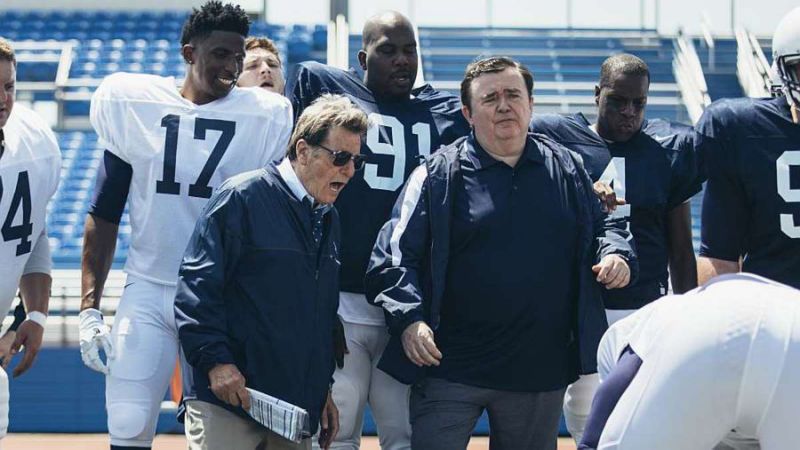 Al Pacino has specialized in playing actual people for HBO films, from Roy Cohen to Phil Spector, Jack Kavorkian and now Joe Paterno, in an understated and effective portrayal of the beloved Penn State coach whose image was tarnished by its proximity to the considerable claims of sexual misconduct of his former defensive coordinator, Jerry Sandusky.
Al Pacino has specialized in playing actual people for HBO films, from Roy Cohen to Phil Spector, Jack Kavorkian and now Joe Paterno, in an understated and effective portrayal of the beloved Penn State coach whose image was tarnished by its proximity to the considerable claims of sexual misconduct of his former defensive coordinator, Jerry Sandusky.
“Paterno” (HBO, 8 p.m.) gets an interesting interpretation from “Rain Man” and “Diner” director Barry Levinson, who formerly worked with Pacino on the 2010 Kavorkian film for HBO, “You Don’t Know Jack.”
In making films about actual people “we don’t make a replica, but we try to see if we can come close to a sense of the character,” Pacino says.
Speaking to reporters at the TV Critics Association winter press tour earlier this year in California from New York, where was he preparing to portray Tennessee Williams.
“We discuss it and go over it sometimes for many weeks,” he said, “until we come up with something that hopefully conveys something.”
Portraying actual people, is something he’s done “throughout my life, though,” he says. “I think of ‘Serpico,’” the 1973 film about a whistleblowing cop.
The reality of the character is a kind of stepping stone, Pacino says. “They’re the thing that gets you there. And, also, there’s a certain credibility, because these things really happen … you feel kind of credible, in that this really took place.”
Channeling the person is important, the actor says. “And that takes a while. But at the same time, there’s always footage on them. There are so many interviews on them.”
But the best thing is when he can chat with the real person, he says. “Like, when I did ‘Serpico,’ I had the real friend of Serpico, and interplaying with him. And getting stories — fresh, uninhibited, from his own experience — was the most delightful, and the most enjoyable for me.”
But, he adds, the writing, as with Tony Kushner’s rending of Roy Cohn, is of importance — as is direction, from Mike Nichols for “Angels of America” to Levinson, of whom he said, “he inspires me.”
The central question is how Pacino played Paterno: as someone who knew what was going on, or someone who did not.
He did make a decision on that, he said. But he continued to work on it. “As you continue to work on something, you learn as you go because you have a certain amount of time,” Pacino said. “But you absorb the role, and it starts to speak to you and tell you.
“It’s very complex being an actor,” he went on. “No matter how long I’ve done it, it’s always the same thing … It’s about going on this trip and learning as you go, and I’m still learning about this character, believe it or not.”
In one key scene, Paterno recalls a time when his own kids were in the pool with Sandusky — how could he have known if he allowed that? On the other hand, Paterno was so focused on football, he never allowed himself to look.
“I’ll tell you the truth. I found out as I went along, playing the character, how I thought he might have felt about it and how he might have dealt with it,” Pacino says.
“This is all I have. And I try to be careful because there are people out there who have a different opinion about it, the people who are closer to him. So I took my cue from what it was like living through that role.”
Among those things was that Paterno “was certainly in a depressed state,” Pacino says. “I mean, he’s also someone who is 84 years old, and that had something to do with what his needs were, how he perceived things.”
The full truth of Paterno didn’t come out because he died just weeks after Sandusky was indicted. Sara Ganim, the reporter who broke the story locally (and is played in the film by Riley Keough), said “there wasn’t a whole lot of time for enough information to surface, for him to respond to some of the allegations.”
The Penn State community is still torn about what Paterno knew and how much he should be blamed. “It’s only been about seven years since this first broke,” Ganim said. “So it’s very much still a debated topic, Paterno’s legacy. I think, though, that what everybody who worked on the film tried to really do is show that that it is a very much gray area for a lot of people; that it’s not something that is completely known, one way or another, exactly what he knew.”
“The questioning of it I think is part of the fabric of the piece,” said Levinson. “Because it’s not like some sort of docudrama that you’re just laying it all out. There is a nuance to the work, and I think that’s what makes this project so fascinating, because it is truly a tragedy, and a tragedy in all things, in terms of what happened with the victims, in terms of what happened with Paterno, whether you think he did or he didn’t, it is ultimately a tragedy. It is a tragedy of enormous size.”